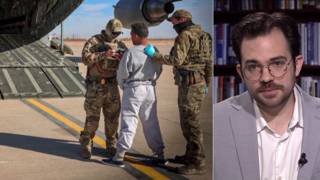
As President Obama takes executive action on gun control without going through Congress, could closing Guantánamo be next? In January 2009, Obama ordered the closure of the Guantánamo Bay military prison in one of his first executive actions. Seven years later, 107 prisoners are still there. We speak with Caroline Fredrickson, president of the American Constitution Society for Law and Policy. “I think something that’s really important for people to remember is that President George W. Bush opened Guantánamo on his own say-so, without Congress, without any authorization, any legislation to do so,” Fredrickson says. “Obviously, Congress can use the power of the purse … But in terms of the president’s basic authority, he certainly has that.”
Transcript
AMY GOODMAN: And, Caroline Fredrickson, I’d like you to stay on for one minute to address another issue—not guns, but the issue of the executive authority of the president, what power President Obama can use, that we’re seeing he’s using on the issue of gun control. Could he use this to close the Guantánamo prison camp without congressional approval? In January 2009, one of his first executive orders was calling for the closure of the Guantánamo Bay military prison. Seven years later, 107 prisoners are still there.
CAROLINE FREDRICKSON: Well, so, you know, I think something that’s really important for people to remember is that President George W. Bush opened Guantánamo on his own say-so, without Congress, without any authorization, any legislation to do so. So I would call people’s attention—there was a very important Washington Post opinion piece about a month or so ago by Cliff Sloan, who is the special envoy to close Guantánamo appointed by John Kerry, secretary of state, and Greg Craig, who’s the former White House counsel. And they argue, quite convincingly, that the president is fully within his executive authority to close Guantánamo without going through Congress, because of that very same power that George W. Bush used to open Guantánamo, which is the commander-in-chief power, which is in his purview to take significant actions to affect our national security. And so, I think that’s a very compelling argument. Now, obviously, Congress can use the power of the purse to try and limit that. But in terms of the president’s basic authority, he certainly has that.
AMY GOODMAN: Caroline Fredrickson, I want to thank you for being with us—
CAROLINE FREDRICKSON: Thank you.
AMY GOODMAN: —president of the American Constitutional Society for Law and Policy.
This is Democracy Now!, democracynow.org, The War and Peace Report. When we come back, we go to Chicago to hear the story of a man who has lived in this country for a quarter of a century. He comes from Turkey, was imprisoned and tortured there. Now the U.S. is threatening to send him back. We’ll speak with him, his daughter and his lawyer. Stay with us.













Media Options